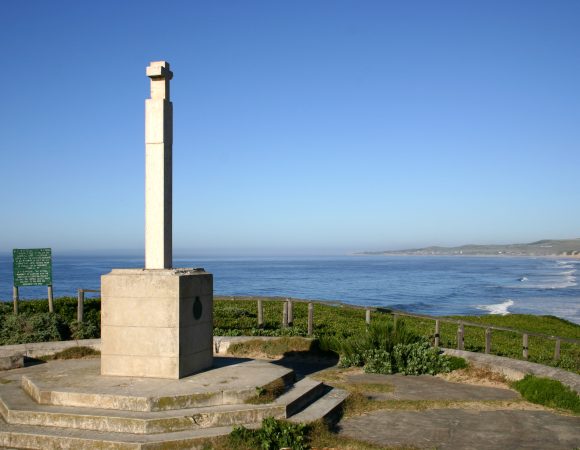Immerse yourself in the area’s rich local heritage
Aside from the local heritage that can be found in your daily wanderings of Kenton, you can also explore a rich local heritage from early indigenous habitats and shipwrecked explorers to 19th-century settlers and the evolution of today’s tight-knit community.
Cultural experiences
The cultural tapestry of Kenton is enriched by its diverse surrounding communities. The nearby township of Ekuphumleni, home to many of Kenton’s residents, has a vibrant Xhosa heritage. Neighbouring communities such as Marselle and Klipfontein also contribute to the area’s rich cultural landscape. A guided tour through these areas offers an authentic glimpse into local life – you might meet a sangoma (traditional healer), hear children singing at a school, or stop in at one of the many local taverns for a taste of everyday community spirit.
Dias Cross and early explorers
Long before European settlers, Portuguese navigator Bartolomeu Dias charted this coastline in 1488. A replica of the stone padrão (cross) he erected can be found at Dias Cross, which lies between Kenton and Boknes. Reaching the Dias Cross requires a bit of an adventure – either a 5 km hike along the beach from Boesman’s River mouth or a 4 km walk from Boknes – but it’s a tangible link to the Age of Exploration. Standing there, looking out at the vast Indian Ocean, you can imagine the Portuguese caravels sailing by over 500 years ago. The original cross (what remained of it) was removed to a museum for preservation, but the replica marks the spot of this historical milestone. It’s one of the oldest European artefacts in South Africa and a testament to the maritime history of the Sunshine Coast.
Frontier history
Kenton lies in a region that was once the frontier between the British Cape Colony and Xhosa lands during the 18th and 19th centuries. Just 30 minute’s drive north is Makhanda (Grahamstown), a town founded in 1812 which became a key military outpost – today it’s known for its preserved settler architecture and the annual National Arts Festival. Many of Kenton’s early residents in the 1900s had ties to Grahamstown and the surrounding farms.
For unique historical expeditions, Alan Weyer is well-known for his informative historical tours leaving from Grahamstown.
Travel a bit east and you’ll find Bathurst, home to the Big Pineapple and the historic Pig & Whistle Inn (built in 1832, reputedly the oldest trading pub in South Africa). Take in sweeping views and trace settler history at Bathurst’s iconic Toposcope.
Then, just 15 minutes inland from Kenton is Alexandria (Alex), another settler-era town featuring a beautiful Dutch Reformed Church dating back to the 1860s. Once home to the Khoi San and elephants roaming the coastal forests, Alexandria is steeped in natural and cultural history. These surrounding towns, like Bathurst and Alexandria, are rich in historical value and worth a visit, giving context to Kenton’s place in South Africa’s colonial frontier history.
Located 30 km inland from Kenton, is the small town of Salem. Salem got its name, meaning “peace”, when the Xhosa agreed to leave the village after negotiations during the War of Hintsa. The village features the Methodist Church, built in 1832 by the 1820 settlers. Salem also boasts an active cricket club and offers scenic views of surrounding farmlands.









